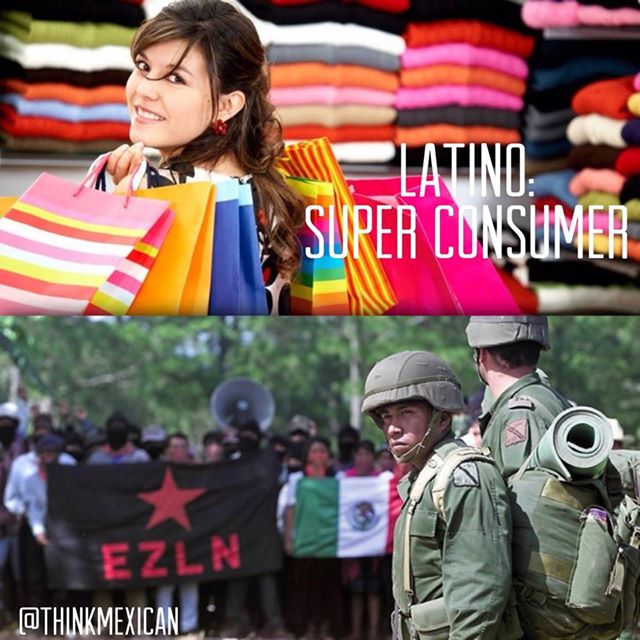Latino: the Manufactured Super Consumer (July 4, 2014)

Tweet
I. Who promotes the term 'Latino' and why?
'Latino' is a marketing term used to subsume Mexicans into other Spanish speaking identities in the United States. While individuals may have their own intuitions about its use, beliefs about empowerment and potential arguments for needing the term, from a marketing perspective, 'Latino' is a way for corporations to simplify their relationship with a demographic of consumers.
Thus, adopting 'Latino' uncritically as an identity is inherently questionable when so many marketers and corporations have been involved in defining the culture and ideology entailed by the term.
The U.S. media use the term 'Latino' to dissociate individuals from their national and ethnic identity and connect them to the consumer market. This allows the U.S. to intervene in these countries without suffering the consequences of domestic protest. They drive them away from political interests and into frivolous consumerist goals.
From an economic standpoint, this makes perfect sense. If you work at a large multi-national marketing firm, you want to reduce your target audience to as simple of an entity in order to hone your marketing and product development strategy. There is great incentive to do so, as this
Forbes article notes:
"The emergence of Hispanics as a consumer force is growing rapidly, with a purchasing power expected to reach $1.5 trillion dollars in 2015. Dubbed 'super consumers' Latinos in the U.S. are blowing past the mainstream and other minority groups in this regard."
&
"Hispanic online and mobile usage is among the highest of any group and continues to increase faster than the general marketplace."
The term Latino implies dollar signs, not a political struggle. Marketers and businesses (an advertiser's actual customer) use the term to reduce the various complex identities from Latin America in the United States to their most basic similarity: not white and Spanish speaking. The rest, from their perspective, is very irrelevant. If people believe they are 'Latino' , then the only problem left for advertisers is refining and expanding the definition so that it better resembles an actual cultural identity.
II. Passive Populations Make Military Intervention Easier for the U.S. Government
U.S. foreign policy in Mexico depends on the Mexican community constantly being on the defensive, confused and complacent with whatever ill-will the government directly and indirectly expresses towards them. In order for U.S. foreign policy to work in Mexico, Mexicans in the United States must dissociate themselves from the political process in Mexico. 'Latino' becomes a very useful term in this context. Mexicans are encouraged to just shut up and work towards becoming passive 'Latinos' in the United States. This helps Chicanos avoid the 'cognitive dissonance' whenever they attempt to make sense of the hostility directed at them. It makes life easy for Mexicans who wish to 'just get by', not think about complex things and make a little money.
For instance, we can view Hilary Clinton's statement to Greta Van Susteren as a direct attack on our community: "just because your child gets across the border doesn't mean your child gets to stay" is a very clear message of animosity towards the Mexican community. Why are we not all protesting her statements? What other community has had its history banned in an American state? Just Mexicans in recent memory.
Why is this policy of constant deportation so vehemently pursued by government officials? Perhaps, the government wishes to use the Mexican community as a scapegoat to explain the terrible state of the economy. This was partially made possible because there has been no significant pushback too. Chicanos, as a whole, have been very busy being neutral through being 'Latino'.
My point is that while some Chicanos were busy being 'Latino', the U.S. government was busy being itself and shipped weapons to undemocratic right wing paramilitary, gave training to the Mexican military and fixed the Caldéron and Peña Nieto elections in Mexico.
The U.S. government would like to reassert territorial dominance over the U.S. southwest and northern Mexico. That is basically what border enforcement and SB-1070 are about. The economic and social fragmentation of Mexican migrants in the United States is not an accident, and has real consequences. For example, most second generation Mexicans are completely ignorant of politics in Mexico and embrace this ignorance as a sign of Americanism. These people often call themselves 'Latino' before they call themselves 'Mexican' in order to avoid conflict with non-Chicanos. Chicanos now have to deal with the psychological blow of our own people asserting their legal status, inability to speak Spanish and preference for American culture as symbols of their legitimacy. The fact that half of the United States was formerly Mexico is lost in this confusion.
The fear created by the U.S. government's divide and conquer strategy has served them well. Plan Merida has been virtually unopposed in the United States. Most Chicanos (even those who are educated) do not know the full scale of military intervention in Mexico orchestrated by the United States. Many Chicanos still think Mexican cartels are the most guilty of the harm done to Mexico during the peak years of the ''Drug War''. What they do not know is that the United States sent military hardware, personnel and money to the Mexican government. These resources were then turned against activists, the EZLN and also found their ways into preferred drug traffickers.
In other words, the term 'Latino' not only turns Raza into consumers, but also into unwilling collaborators with the state. Our acquiescence and ignorance of U.S. foreign policy is a direct consequence with identifying with the word 'Latino'. When Chicanos don't identify with the nationality of 'Mexican', we stop caring about the political processes that we could positively influence. We forget that we can have two countries instead of none.
The fact that the government and corporations benefit from Mexicans self-identifying with the term 'Latino' does not answer why 'Latino' is so constantly used by our people. At an emotional level, I think the term 'Latino' gives some of us a superficial sense of belonging to a larger community. Somehow people forget - or never learn - the specific history between them and the United States. The term 'Latino' helps solidify that ignorance, because it prevents us from grasping a historically grounded reality. The term 'Latino' unifies us in the wrong way; it unifies us through collective ignorance of our own individual history.




